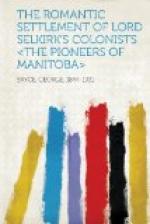To the partners McLeod and the others, however much in earnest the actors might be, it afforded much amusement, and gave hope of a strength and enthusiasm that would bind them fast to the “Nor’-Wester” side.
The struggle over and the battle won, while leaving the garrison sufficient to hold the fort, ten days after the fight the partners and those forming the Northern brigade, who were to penetrate to the wilds to Athabasca, departed. They were following down the Red River and Lake Winnipeg, in the very path which the fleeing Colonists had gone, but they would turn toward the “Grand Rapids” at the spot where the great river of the West pours into Lake Winnipeg, and by this way speed themselves to the great hunting fields of the North. The departure of what was called the Grand Brigade was signalized by an artillery salute from Fort Douglas, which resounded through the wretched ruins of the houses burnt the previous year, and over the fields deserted by the Colonists and left to the chattering blackbird and the howling wolf. Almost every race of people—however small—has its bard. Among the Bois-brules was the son of old Pierre Falcon, a French-Canadian, of some influence among the natives. This young poet was a character. He had the French vivacity, the prejudice of race, the devotion to the Scotch Fur Company and a considerable rhyming talent. Many years after Pierre Falcon won the admiration of the buffalo hunter and was the friend of all the dusky maidens who followed his song of love or war alike. He it was who sang the song of his race and helped to keep up the love of fun among the French people of the Red River. It was reminiscent of victory and also a forecast of future influence and power. Various versions of Pierre Falcon’s song have come down to us celebrating the victory of Seven Oaks. We give a simple translation of the bard’s effusion:
Pierre Falcon’s song.
Come listen to this song of
truth!
A song of the brave Bois-brules,
Who at Frog Plain took three
captives,
Strangers come to rob our
country.
When dismounting there to
rest us,
A cry is raised—the
English!
They are coming to attack
us,
So we hasten forth to meet
them.
I looked upon their army,
They are motionless and downcast;
So, as honor would incline
us
We desire with them to parley.
But their leader, moved with
anger,
Gives the word to fire upon
us;
And imperiously repeats it,
Rushing on to this destruction.
Having seen us pass his stronghold,
He had thought to strike with
terror
The Bois-brules; ah! mistaken,
Many of his soldiers perish.
But a few escaped the slaughter,
Rushing from the field of
battle;
Oh, to see the English fleeing!
Oh, the shouts of their pursuers!




